Tech in 2012: The BBC's most read stories of the year
- Published
Adam Leach of Ovum, Emma Mulqueeny of Rewired State, and Will Jackson of robot manufacturers Engineered Arts, on 2012's developments
As 2012 draws to a close, the BBC online tech team crunched the clicks to reveal the section's most read stories of the year.
These last 12 months have been marked by the rise of low-cost tablets, ultra-slim laptops and "phablets" - outsized smartphones that looked extravagant in January, but have since become the new norm.
We've seen handsets turn into wallets thanks to near-field communication (NFC) technology, Google push the boundaries of augmented reality with its Google Glass headsets, 4G arrive in the UK and Twitter break records during the 2012 Olympics.
We've also witnessed a number of high-profile patent trials, including one which saw a US court ordering Samsung to pay Apple $1.05bn (£652m) in damages for infringing its intellectual rights.
Then there was Facebook's flotation, and Google executive Marissa Mayer taking charge of Yahoo after her predecessor stepped down amid accusations of a fake computer science degree on his CV.
All big stories, but none of them made it onto the list of articles you, the readers, clicked on the most.
At the top of the page the BBC's World Service technology correspondent hosts his own tech summit to find out what three wired-in insiders made of the past 52 weeks.
What follows are what proved to be your favourites.
January
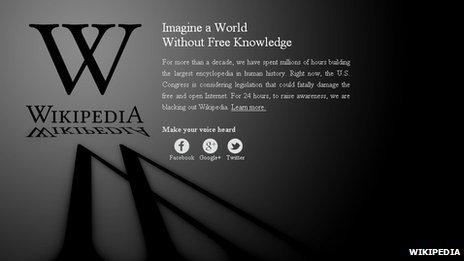
The year started with protests against anti-piracy laws in the US - the Stop Online Piracy Act (Sopa) and Protect Intellectual Property Act (Pipa).
News that Wikipedia had taken its English-language site offline as part of the campaign became the most-read story of January.
Users attempting to access the site saw a black screen and a statement saying: "Imagine a world without free knowledge."
The proposed legislation was meant to allow the US Justice Department and content owners to seek court orders requiring search engines to block results associated with piracy.
But following the protests, the US Congress halted debate on the contested bills.
February
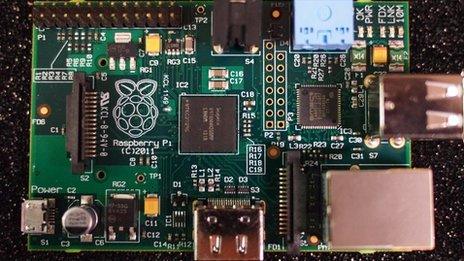
In February, the Raspberry Pi became the break-out story with news that the mini-computer had gone on sale.
This credit-card sized, low-cost PC was created by volunteers to help teach children to code.
Supporters say the machines could help reverse a lack of programming skills in the UK.
More than 750,000 devices have been sold to users around the world, and in December, the Pi Store opened - a one-stop shop where anyone can share games, applications and tools developed for the computer.
Other super-budget computers followed in its wake, but none have had the same impact so far.
March
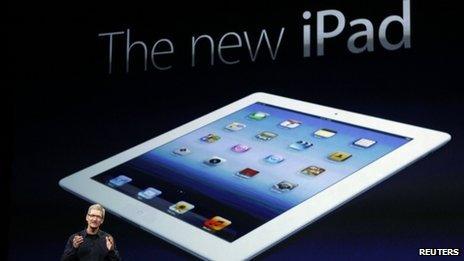
March provided Apple with its first opportunity to dominate the news after the firm unveiled its first iPad with a high-definition "retina" screen.
Although the firm's tablet is still the market-leader, a report issued by ABI Research in November indicated that Apple's share of worldwide shipments had dropped from a 69% share in the April-to-June period to a 55% portion the following quarter.
Competition from Amazon's Kindle Fire and Google's Nexus 7 may have been responsible for the product being updated eight months later - a faster turnaround than had been expected.
April
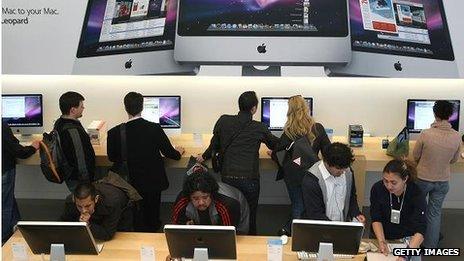
Apple topped the list again the following month - but this time for all the wrong reasons with news that more than half a million Mac computers had been infected with malware, according to a Russian anti-virus firm.
Dr Web reported in April that about 600,000 Macs had installed the Flashback Trojan, potentially allowing them to be hijacked via a vulnerability in the Java programming language.
Apple later released a software update that removed the Java plug-in from internet browsers on its machines - a setback for its developer, Oracle.
May

News of another cyber-attack that collected private data from countries such as Israel and Iran made headlines in May.
Russian security firm Kaspersky Labs said the malware, known as Flame, had been in operation since August 2010, and described it as "one of the most complex threats ever discovered".
It was later suggested that Flame might date back further to 2006.
June
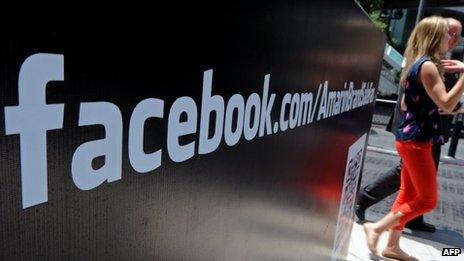
In June, Facebook faced a backlash from users after it replaced email addresses listed in members' contacts with ones provided by its @facebook.com system.
Some branded the move "annoying" and "lame" and posted instructions about how to switch back to the original addresses.
"We are providing every Facebook user with his or her own Facebook email address because we find that many users find it useful to connect with each other, but using Facebook email is completely up to you," said a statement from the company.
Several users later complained the social network had erased email contacts in their mobile phone address books, replacing them with @facebook.com listings; Facebook promised to address the issue.
July
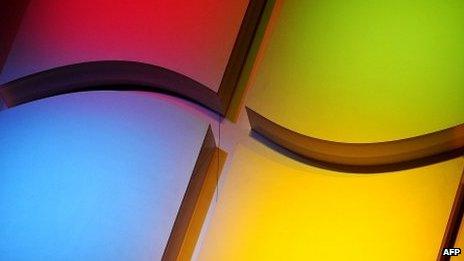
July saw one of the year's most unusual headlines rise to prominence: Microsoft fixes "big boobs" coding gaffe.
A string of characters - 0xB16B00B5 - had been buried in code written to help a Microsoft program work with Linux open source software.
Some were not amused.
"Puerile sniggering at breasts contributes to the continuing impression that software development is a boys' club," wrote one leading engineer.
It hadn't helped that the revelation came just a month after Microsoft had had to apologise for what it described as "offensive elements and vulgar language" included in a presentation in Norway.
Once again the firm had to make its excuses, and shortly after released a patch that changed the string's spelling.
August
Archive footage from May 2010 shows the Waverider in action
August's top story switched from the digital world to military hardware and an attempt by a hypersonic jet to set a new speed record.
The US Air Force's unmanned Waverider aircraft had been designed to fly at six times the speed of sound (3,600mph; 5795km/hr) for five minutes.
At that velocity it could travel from London to New York in about an hour. The Pentagon and Nasa hoped to use the technology to develop faster missiles.
But seconds into its mission an error occurred and the craft ended up breaking up over the Pacific Ocean,
It was the second time the experiment had failed - a third, final attempt has been scheduled for next year.
September
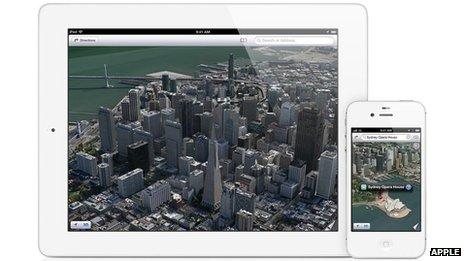
Apple bungled its way back to the most-read list again in September with the launch of its iOS 6 Maps app,
Missing towns, bridges that looked like they'd been sketched by a surrealist and satellite images that only showed clouds were among its many flaws.
To make matters worse the previously reliable Google-powered option could not be reinstalled once users had made the switch.
A backlash ensued leading to an apology from chief executive Tim Cook followed by the ousting of two senior executives linked to the project.
That didn't stop the complaints continuing - with a recent example from the Australian police suggesting that a mistake in the app could prove "life-threatening".
But any threat to sales of the iPhone was offset by Google's release of a native version of its maps software for the handset in December, which can now sit alongside Apple's own offering.
October

In October, it was Mozilla's turn to come under pressure after a security vulnerability was discovered in the latest version of its Firefox browser.
The firm confirmed the flaw could allow "malicious sites" to determine what pages a user had visited.
About 450 million people use the program, but the firm said only "a limited number" had been affected.
The download was quickly yanked offline and a fix followed.
November
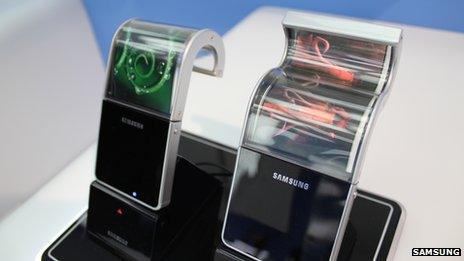
In November, the most-read story was a look at flexible phones of the future.
A number of companies are currently working on razor-thin, paper-like and bendable handsets, and some have promised to launch such devices in 2013.
This could become one of next year's big themes.
Samsung has already announced it intends to make a splash at the Consumer Electronics Show (CES) in Las Vegas next month with a pair of bendy displays
If the rumours are to be believed one will be designed for a handset and the other a TV.
December
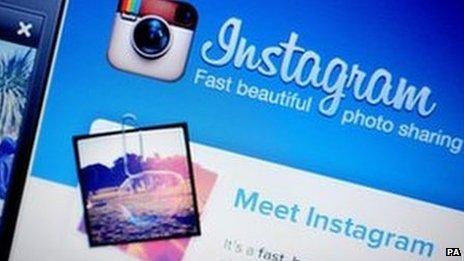
And finally, the biggest story of December was Facebook's photo-sharing site Instagram revamping its privacy policy.
Some vague language meant the rewritten terms could be read to mean that the site had the right to sell users' photos to advertisers without notice. Threats of boycotts followed.
The firm rushed out a statement saying users had misinterpreted the agreement as a consequence of its confusing" choice of language.
The text was switched back to its original version to give the firm time to work out how best to amend it to ensure it can start making money without the risk of scaring off its members.
- Published18 January 2012
- Published29 February 2012
- Published8 March 2012
- Published5 April 2012
- Published28 May 2012
- Published26 June 2012
- Published20 July 2012
- Published15 August 2012
- Published20 September 2012
- Published11 October 2012
- Published30 November 2012
- Published18 December 2012